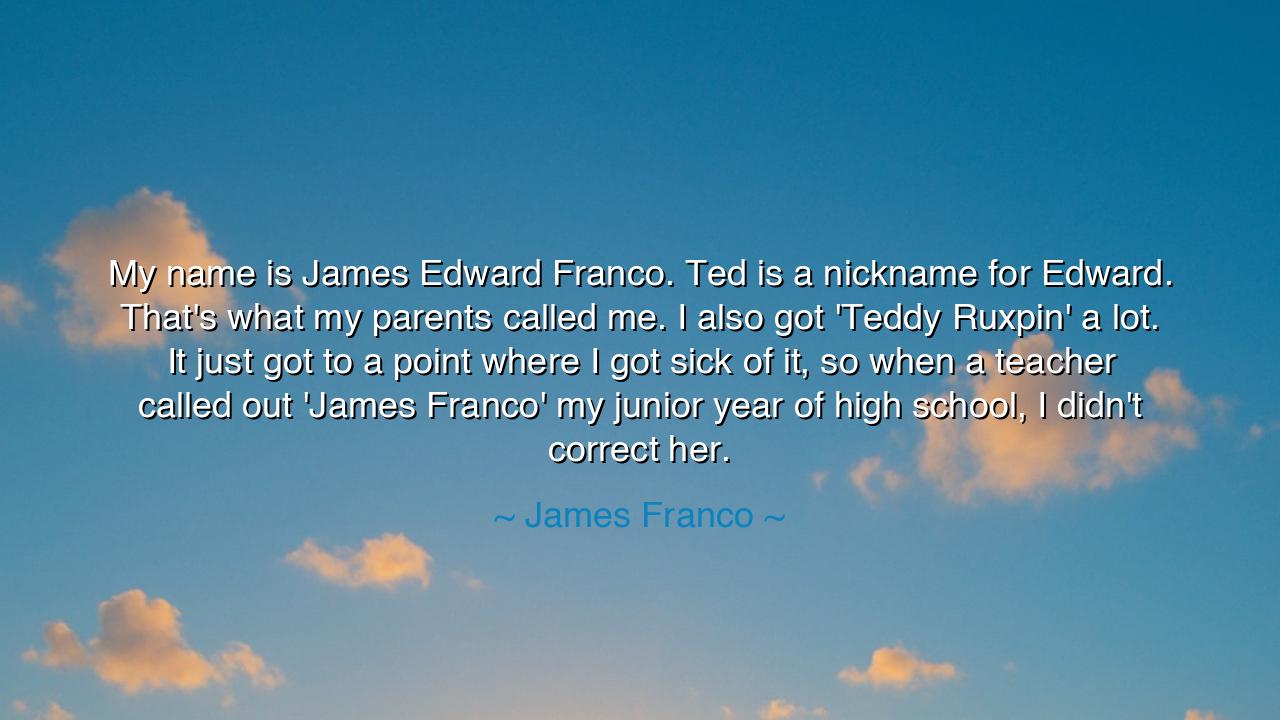
My name is James Edward Franco. Ted is a nickname for Edward.
My name is James Edward Franco. Ted is a nickname for Edward. That's what my parents called me. I also got 'Teddy Ruxpin' a lot. It just got to a point where I got sick of it, so when a teacher called out 'James Franco' my junior year of high school, I didn't correct her.






Hearken, O children of identity and patience, to the reflection of James Franco, whose words reveal the quiet struggle of selfhood amidst the currents of misunderstanding: “My name is James Edward Franco. Ted is a nickname for Edward. That’s what my parents called me. I also got 'Teddy Ruxpin' a lot. It just got to a point where I got sick of it, so when a teacher called out 'James Franco' my junior year of high school, I didn’t correct her.” In these words lies a meditation upon the shaping of personal identity, the weariness of misrecognition, and the subtle power of choosing when to assert oneself.
Franco’s reflection illuminates the burden of labels and the fatigue that accompanies constant correction. The child, called by many names—some affectionate, some mocking—experiences a quiet erosion of self, a tension between external perception and inner reality. In choosing not to correct the teacher, Franco exercises a form of agency, a deliberate act of self-preservation and adaptation, acknowledging that energy spent on dispute may be better invested elsewhere. Herein lies an ancient lesson: wisdom often lies in discerning which battles are worth the spirit.
Consider the story of Mark Twain, born Samuel Clemens, who lived under a given name while cultivating a literary identity. He bore the duality of private and public selves, navigating the tensions between familial, societal, and personal naming. Twain’s choice of pen name became an assertion of identity, yet he also understood the art of timing and discretion, employing his given and chosen names where each served a purpose. Franco’s experience echoes this: the naming of self is both a matter of heritage and of strategic adaptation.
The essence of this teaching lies in patience, discretion, and self-definition. The young Franco endured the teasing and the misnaming, cultivating resilience in the process. By the time a teacher addressed him by a name aligned with his formal identity, he exercised judgment, choosing when to correct and when to allow ease and peace to prevail. There is great power in this: the mastery of response, the ability to assert identity without unnecessary conflict, and the cultivation of patience in the face of repeated misperception.
Even in modern times, the challenge of recognition and respect for identity persists. Individuals navigate names, nicknames, cultural markers, and personal preferences, often encountering misunderstanding or mockery. Those who succeed in social and professional spheres learn the balance Franco demonstrates: to protect one’s dignity, to choose battles wisely, and to affirm identity without letting every misstep wound the spirit. The lesson extends beyond mere naming—it is the cultivation of grace under misperception.
This reflection also emphasizes the power of choice. Franco could have insisted upon correction at every moment, yet he recognized the value of letting certain things pass. True freedom and self-sovereignty lie not only in asserting oneself but in choosing the path of strategic acceptance. In doing so, he preserved energy for matters of greater consequence, developing resilience and wisdom that would serve him well beyond high school corridors.
O children of discernment, take this teaching to heart: honor your name, your identity, and your personal truth, yet cultivate patience and discretion in the exercise of your will. Not every misrecognition demands correction; not every slight requires response. By choosing wisely, one nurtures the inner self, preserves energy, and cultivates the power to act decisively when the moment truly demands it.
Thus, let the words of James Franco echo through the halls of your own experience: identity is precious, but so too is the wisdom to navigate misperception with grace. Endure minor misunderstandings, conserve your strength for battles that matter, and assert yourself with deliberate intent. In this balance, the self is preserved, resilience is cultivated, and the spirit is strengthened, ready to navigate the currents of life with clarity and dignity.
If you wish, I can also create a practical guide for managing personal identity and social misperception, inspired by Franco’s reflection, with daily exercises to assert selfhood wisely and cultivate patience. Do you want me to do that?






AAdministratorAdministrator
Welcome, honored guests. Please leave a comment, we will respond soon